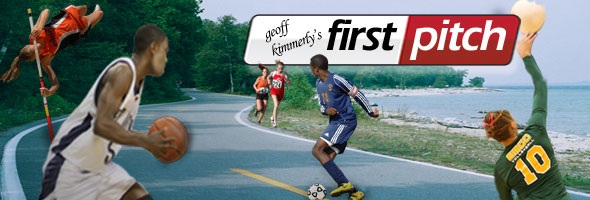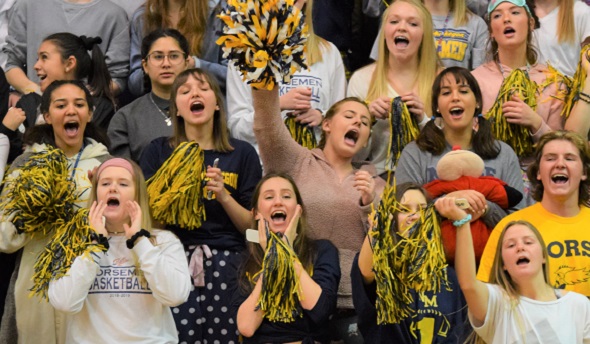
Things change; lessons are the same
February 29, 2012
Let's start with the obvious: High school sports have evolved a bit since 1927.
But the MHSAA Bulletin from March of that year -- dug up by one of our directors on another research pursuit -- reminds us how some of our challenges remain the same.
Below are a few excerpts from the section titled "Baseball and Sportsmanship." Keep in mind, baseball was the football and basketball of the first half of the 1900s. The 1927 New York Yankees arguably were the greatest baseball team of all-time, finishing 110-44 thanks to Babe Ruth, Lou Gehrig and others.
Those names alone make us think in a historical context -- which makes the parallel between today and the following that much more intriguing:
Baseball games furnish a difficult problem to schools in the matter of sportsmanship, spectator control and their education.
Many more people are familiar with the game of baseball and its rules than is true of either football or basketball. Consequently, they feel even more qualified to criticize.
In many places, absence of seating facilities bring the spectators into close proximity to players with the result that criticism of players and of the official and sometimes abusive remarks to the visiting team can occur. No school can hope to improve this situation by ignoring it.
The MHSAA Bulletin went on to cite suggestions for improvement that had been published by the Delaware association. Again, a sampling:
Treat the visiting team as guests, not as deadly enemies. Small youngsters often offend through ignorance. Educate them along this line.
Fair and impartial applause of good plays by either side should be encouraged in the student body, and the outside fans will soon fall in line.
"Razzing" or "riding" visiting players is poor sportsmanship.
Caution your boys to pay no attention to the "grandstand experts" who feel it their duty to offer suggestions as to the work of the team. They can sometimes do more harm in an hour than can be overcome in days of practice.
And a final note from the 1927 MHSAA on the subject:
An athletic contest properly staged and handled creates a favorable impression on the part of visitors toward your school and community. A game that deteriorates into a backyard squabble hurts not only the school and its executives, but the town as well.

BOTF IX: Can You Cheer with the Champs?
By
Geoff Kimmerly
MHSAA.com senior editor
December 10, 2019
Six schools have won at least one Battle of the Fans championship since the contest was created during the 2011-12 school year.
This year, it could be your school's turn to show it has the top high school cheering section in Michigan.
The MHSAA's Student Advisory Council is calling all contenders to take part in Battle of the Fans IX.
North Muskegon was named last year’s champion and presented with a banner during the MHSAA Boys Basketball Finals at Michigan State University’s Breslin Center. Sections from Buchanan and Saginaw Heritage also were finalists, with Ann Arbor Father Gabriel Richard, Carson City-Crystal, Petersburg-Summerfield, Petoskey, Traverse City West and Wayland’s sections also making the semifinals.
Schools are invited to submit a short video, via YouTube, of their cheering sections in action at a school sporting event. Video submissions should be between 90 seconds and three minutes long and explain how that section meets the following contest criteria: positive sportsmanship, student body participation, school spirit, originality of cheers, organization of the group, student section leadership and fun.
The deadline for student-submitted video applications is noon Jan. 11. Nine semifinalists then will be chosen – three each from Class A, Class B and Class C/D – to partake in a two-week challenge where each will be required to complete 10 tasks further showing why it should be chosen as Michigan’s best student section. From those nine, three finalists then will be selected by the Student Advisory Council and visited on a home game night by MHSAA staff and Advisory Council representatives. The MHSAA will produce a video of that finalist after each visit, with the champion being selected by the Student Advisory Council based in part on support each section receives on the MHSAA’s social media sites.
This year’s Battle of the Fans IX winner will be announced Feb. 21 and recognized March 27 at the Breslin Center.
“Nearly a decade after our Student Advisory Council developed this first-of-its-kind contest, Battle of the Fans is still going strong —not only as a way to award supreme sportsmanship, but also as an engine to drive school spirit,” said Andy Frushour, MHSAA director of brand management and advisor to the Student Advisory Council. “Over the first eight years, we have had plenty of winners that started as small, unorganized and negative student sections. But with enough planning and assistance from administration – and over just three short months – those sections turned into loud, crazy, fun places to be on game nights. We hope that happens with schools again this winter.”
Rules, directions for submitting videos, plus links to coverage of finalists from the first eight years of the contest can be found on the MHSAA Website. This year’s finalist videos, plus the announcement of the 2019-20 winner, will be published on Second Half.
The Student Advisory Council is made up of eight seniors and eight juniors who each serve two-year terms. The Council acts as the voice of Michigan's student-athletes; it serves as a student sounding board for the MHSAA's Representative Council, assists in planning Sportsmanship Summits, Captains Clinics and other student leadership events; participates in a yearly focus group about the state of high school sports for Michigan State University's Institute for the Study of Youth Sports and assists with medal ceremonies at MHSAA championship events.
PHOTO: Traverse City West shined plenty of bright lights when we visited as part of the 2017 BOTF finalists tour. VIDEOS: Below, check out the videos from our visits to all of the first eight BOTF champions.

